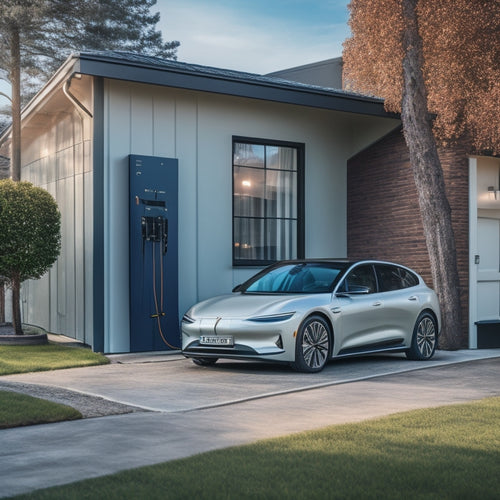
Average Cost of Residential Solar Panel Installation
Share
On average, you can expect to pay between $15,000 and $30,000 for a residential solar panel installation, with the average cost per watt ranging from $2.96 to $3.24. The final cost depends on factors like system size, panel efficiency, and the installation company's reputation. Shopping around for local installers and understanding the interplay of these factors can help you find the best deal. As you explore your options, you'll uncover more nuances that can impact the total cost and long-term benefits of your solar panel investment.
Key Takeaways
• The average cost of solar panels in California ranges from $2.96 to $3.24 per watt, depending on system size, equipment quality, and installation company.
• High-efficiency solar panels cost more but provide more energy per hour of sunlight, making them a worthwhile investment for some homeowners.
• System size affects installation costs, with larger systems potentially costing less per watt due to economies of scale, but complex installations increase labor costs.
• Shopping around and comparing quotes from local installers can help homeowners find the best deal, considering factors like installation quality, equipment quality, and company reputation.
• Federal, state, and local incentives, such as the Solar Investment Tax Credit, grants, and exemptions, can significantly reduce the upfront cost of residential solar panel installation.
Factors Affecting Solar Panel Cost
The cost of solar panels varies greatly depending on several key factors, including the type and quality of the panels, the installation company, and the complexity of the installation.
As you consider investing in solar energy, understanding how these factors impact the overall cost of your system is vital.
One critical factor is panel efficiency, which affects how much energy your system can produce.
Higher-efficiency panels typically cost more, but they can generate more power per hour of sunlight.
You'll want to weigh the benefits of increased energy production against the higher upfront cost.
Another key factor is installation quality, which directly impacts the system's performance and longevity.
A reputable installation company with experienced professionals will likely charge more than a lesser-known company.
However, their expertise guarantees a safe, efficient, and optimized system that will save you money in the long run.
California Solar Panel Installation Prices
You can expect to pay between $2.44 and $3.58 per watt for a residential solar panel system in California, with the average cost per watt ranging from $2.96 to $3.24.
This cost range is influenced by various factors, including the system size, equipment quality, and installation company. California regulations, such as the California Solar Initiative, have created a favorable environment for residential solar adoption, driving down costs and increasing adoption rates.
To get the best deal, shop around and compare quotes from local installers.
Many local installers in California offer competitive pricing, and some may even provide additional incentives or discounts. Be certain to research and vet potential installers to verify you're working with a reputable company that meets California's stringent installation standards.
Average Cost of Solar Panels
Purchasing a solar panel system can cost anywhere from $15,680 to $23,520, assuming a standard 5-kilowatt system, with the average cost of solar panels ranging from $2.96 to $3.24 per watt.
As you consider investing in solar energy, you must understand the average cost of solar panels. You're likely motivated by the desire to reduce your environmental impact and increase energy efficiency. Solar panels can help you achieve these goals while saving you money on your energy bills.
The cost of solar panels varies depending on factors such as the quality of the panels, the brand, and the installation company. High-efficiency panels may cost more, but they can provide more energy per hour of sunlight.
When choosing solar panels, consider the wattage, efficiency, and durability. Be sure to research and compare prices from different manufacturers to find the best option for your needs and budget.
You should know that investing in solar panels won't only reduce your carbon footprint but also increase your property value.
System Size and Installation Costs
As you consider the overall cost of your solar panel system, sizing your system correctly is key, since installation costs vary substantially depending on the system size, ranging from $2.75 to $3.45 per watt. A larger system doesn't always mean higher costs, as economies of scale come into play. However, more complex installations, such as those with multiple roof angles or skylights, can increase labor costs.
| System Size (kW) | Average Cost | Cost per Watt |
|---|---|---|
| 3-4 kW | $8,250 - $11,500 | $2.75 - $3.45 |
| 5-6 kW | $13,750 - $19,500 | $2.75 - $3.45 |
| 7-8 kW | $19,250 - $26,800 | $2.75 - $3.45 |
| 9-10 kW | $24,750 - $34,500 | $2.75 - $3.45 |
Keep in mind that roof complexity and labor costs also impact the final bill. A simple, single-story roof with easy access will be less expensive than a multi-story roof with skylights and complex angles. Understanding these factors will help you better estimate the cost of your solar panel system.
Incentives and Rebate Programs
What benefits can you expect from the various incentives and rebate programs designed to offset the upfront costs of going solar? As a homeowner considering solar panel installation, you're likely aware that the initial investment can be substantial.
Fortunately, federal, state, and local governments offer incentives to make the shift to renewable energy more affordable.
At the federal level, you're eligible for a Solar Investment Tax Credit (ITC), which allows you to claim 26% of the total cost of your solar panel system as a tax credit.
Additionally, you may be eligible for Federal Grants, which provide direct funding for solar panel installations.
State governments also offer incentives, such as State Exemptions from sales taxes or property taxes, which can substantially reduce the upfront costs.
Some states even offer cash rebates or performance-based incentives.
Frequently Asked Questions
Can Solar Panels Be Installed on a Metal or Clay Tile Roof?
You can install solar panels on a metal or clay tile roof, but verify the roof's durability and tile compatibility; a structural assessment and customized mounting system may be necessary to secure the panels.
Do Solar Panels Generate Power During a Blackout or Grid Outage?
When the grid goes dark, you're left in the dark - literally. During a blackout, your solar panels won't generate power unless you have a backup power system, prioritizing grid safety, ensuring your safety and convenience.
How Long Does It Take to Install a Residential Solar Panel System?
You'll typically wait 2-3 months for a residential solar panel system installation, factoring in the 1-2 month permit process, and 2-4 weeks for the actual installation, depending on the complexity of your project.
Can I Install Solar Panels Myself to Save on Labor Costs?
"Measure twice, cut once" - wise words for any DIY project. When it comes to installing solar panels yourself, you'll need to weigh DIY incentives against safety risks. You'll save on labor costs, but consider the technical expertise and potential hazards involved.
Will Solar Panels Increase My Property Taxes?
You won't necessarily see a property tax increase; the Tax Assessor will reassess your property value considering local ordinances, and the assessment process typically excludes solar panels' added value, so your taxes might remain unaffected.
Related Posts
-

Why Choose Solar Car Battery Charging Systems?
You're switching to a cleaner, more sustainable transportation option by choosing solar car battery charging systems,...
-

5 Essential Tips for Buying EV Charging Systems Online
When purchasing an EV charging system online, you'll want to make sure you're making an informed decision. First, det...
-

3 Best State and Local Solar Incentives USA
You can greatly reduce your energy dependence and save thousands of dollars by taking advantage of the top state and ...


